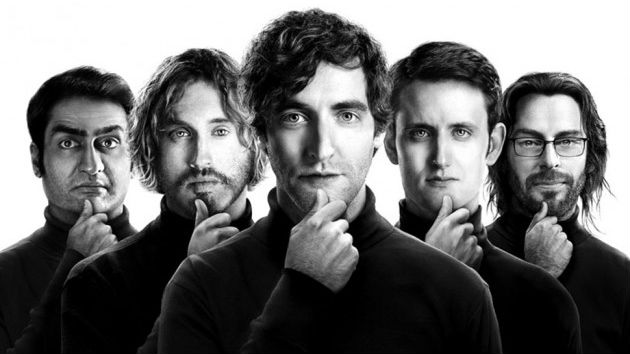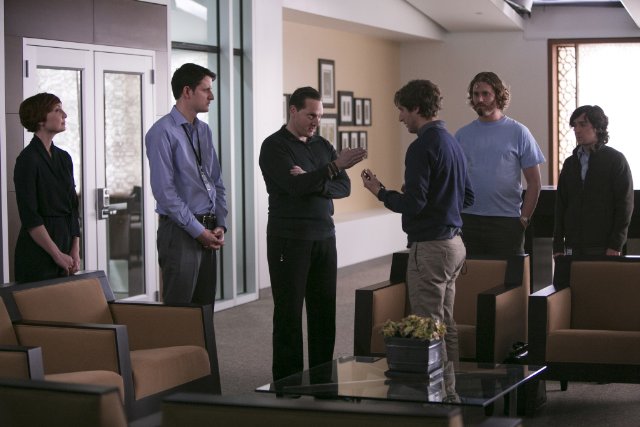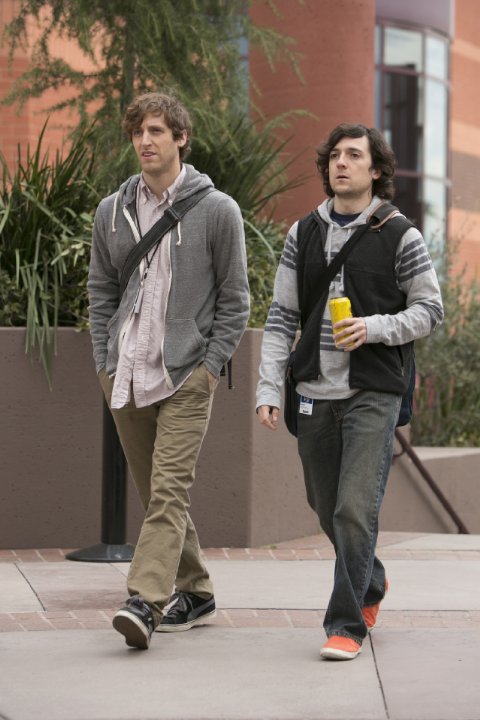What happens when Mike Judge turns his sardonic comedic vision—that same one that brought us Office Space, King of The Hill, and Idiocracy—toward the tech industry of Northern California?
We end up with an HBO show called Silicon Valley that you could describe, in one way, as the late HBO show Entourage (about a band of 20-something wannabe actor dudes in Los Angeles) meets Sex in the City (about a band of single, middle-aged, man-hunting women in New York), The Social Network (a film about Facebook by Aaron Sorkin) and Girls (an HBO series about 20-something millennial-generation women set, largely, in Brooklyn).
Except Silicon Valley is about a tribe of nerds: math-minded, socially awkward, mild-mannered computer guys. In other words, these guys have the discipline, talent, and particular skill set to become exceedingly wealthy in our modern times and successful beyond their wildest imaginations.
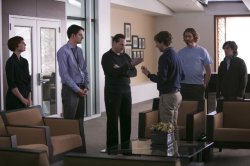 HBO
HBOHBO just extended Silicon Valley to a second season, which is not a surprise. Five episodes in to the premiere season, the comedy is drawing a respectable 1.5 million viewers or more each week. Besides humor, the show delivers lethal, South Park-style social commentary with the ongoing story of a band of techies near Palo Alto, who are living together in a house, hitting it big (kind of) with a start-up and dealing with all the hiccups that accompany success (or failure) in the modern tech industry.
Tech startups are, in a way, the new rock bands in America, representing a youthful desire for wealth, power and fame on par with our existing archetypes: Steve Jobs and Apple; Mark Zuckerberg and Facebook, Sergey Brin and Google. The show's main character, Richard (Thomas Middleditch), goes from mopey outcast to hit-boy in the first episode with his music matching web-site called Pied Piper.
While his web site seems trivial at first, the compression algorithm he builds to run the site becomes a rage in the Valley and creates a bidding war for his talent. First an offer arrives from the chief of a Google-like company called Hooli run by a transcendentalist-loving capitalist named Gavin Belson (Matt Ross) who offers Richard $10 million for his company. Meanwhile, Venture Capital genius Peter Gregory (Christopher Evan Welch) offers Richard $250,000 for a 10% stake in Pied Piper. Richard's decisions set up new series of conflicts, challenges, and choices that drive the plot for the rest of the first season.
Gregory draws striking similarities to real life billionaire Paypal co-founder and Facebook investor Peter Thiel. For example, both men champion smart young people avoiding college. "College has become a cruel expensive joke on the poor and the middle class," Gregory says, delivering a public lecture in the first episode. With some of the best lines on the show, Gregory functions as a libertarian, self-interested source of business wisdom, deadline pressure, and anxiety for Richard and the Pied Piper team.
Many of the conundrums the Pied Piper team faces—funding, management, social ineptitude, IP theft, marketing, authenticity—are (so far) realistic to those that many start-up entrepreneurs wrestle with today. In episode 3, for example, the team is discussing a new name for Pied Piper because some of the team hate the current name. "Are we an Irish pornography company?" asks the character named Erlich (T.J. Miller), who is a Big Lebowski-style landlord and investor in Pied Piper.
Another problem with the name is that Richard failed to notice it was already trademarked by a Pied Piper Sprinkler Company. So he goes to visit the owner—an older man who gripes about "server farms" replacing real farms—in a rural part of California and agrees to buy the name for $1,000. "You're just like my son," the man tells Richard, "He's got Asperger's, too."
While some of the characters do demonstrate behavior represented on the Autism spectrum, the schlubby Erlich fashions himself as the smooth operator, the cool guy in the house, the Steve Jobs of the bunch. Before Richard secures the naming rights, Erlich eats a bag of hallucinogenic mushrooms and drives to the desert to try to conjure up a new name for the company, one of the funniest scenes this season as he rattles through a list of names and world-saving concepts already populating the Valley and decides that Pied Piper isn't a bad name after all.
So far, the reception to the show in the actual Silicon Valley has been mixed. Writers at top tech blogs such as Boing Boing, Pando Daily, and Mashable are recapping each episode as a sign of interest. Some tech industry heavyweights such as software engineer turned Netscape co-founder turned Angel investor Marc Andreessen love it. Meanwhile, others such as Paypal and Tesla founder Elon Musk are said to hate the show, suggesting that it stereotypes and trivializes tech billionaires, CEOs, coders and startup workers in the Valley. "I really feel like Mike Judge has never been to Burning Man," Musk tweeted, after seeing the show.
"I'm just waiting to see if people here laugh," Kara Swisher, a well-known tech journalist who most recently co-founded a site called Re/code, told USA TODAY. Silicon Valley types are "not known for their sense of humor."
And that gets to the reason why the show is important, beyond just entertainment. America is overdue for a show that explores, parodies and excoriates the current boom taking place in the Valley, where two of the largest three companies by market capitalization in America—Apple Inc. and Google Inc. —are based. They are flanked by dozens of public companies such as Oracle, Twitter and Facebook, hundreds of other successful startups and thousands of wannabe successful startups around the nation. Silicon Valley is the new pathway to great riches in America, a wellspring of creativity in the American economy and a setting ripe for parody.
With a libertarian bent and a mind for irony, Judge is far from a cheerleader of the new tech economy. Rather, he portrays the good, bad and absurdity of the startup culture. And he portrays nerds and programmers with a similar sensibility that brought us characters such as Milton (and his red Swingline stapler) from Office Space. He portrays variations of nerds and their overlords with a mix of reverence, scorn and nuance. For example, he highlights "brogrammers," who are apparently a new kind of Silicon Valley computer scientist fratboy type.
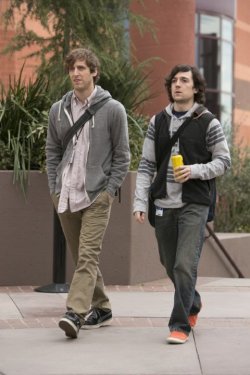 HBO
HBOJudge, himself, worked as a programmer on the F-18 jet and at a startup video card company called Parallax in Northern California in 1987 after graduating with a degree in physics from UC San Diego. He claims to have despised the culture and those colleagues, whom he described as "Stepford Wives." Some point to Judge as a closet conservative (or at least a libertarian) for some of his characters in King of the Hill and of issues in films like Idiocracy.
For many years, New York, Washington and Los Angeles, have dominated as a geographic backdrop for Hollywood films, premium-channel offerings such as the Sopranos, Sex and the City and Girls and Mad Men. The same is true of network and Netflix shows from House of Cards to NYPD Blue to The West Wing.
Meanwhile, as companies in the San Francisco Bay area are driving an increasing amount of innovation and growth in the American economy, Hollywood and TV has left this landscape largely untouched. Up till now, many written works have explored the culture of Silicon Valley (such as Michael Lewis's The New, New Thing, Nick Bilton's Hatching Twitter, and Dave Eggar's novel The Circle) but few films outside of The Social Network and the less noteworthy Vince Vaughn comedy, The Internship, have ventured into these waters. Even fewer TV series have tackled the subject.
Silicon Valley and the Bay Area has developed a unique culture from several waves of boom and bust cycles. The young millionaires who work in these companies have supplanted finance workers as the new "masters of the universe," with their own private, unmarked bus systems that shuttle them from pricy apartments in San Francisco out to Cupertino and Mountain View for work, raising a stink among locals angry about gentrification.
While purporting to "change the world" with technology, the tech hordes have done a lot of good by inventing search engines, gadgets and apps to run on them. But, under the guise of "information yearns to be free," they have also created a lot of disruption in industries such as music, journalism, academia and, yes, TV—forcing industry declines, employee layoffs, and company closures while shifting money from the pockets of established companies to tech industry pockets.
Sure, that's capitalism. But let's not forget that government played a role in creating the Internet—allowing it to be "free"—telecommunications policy and other infrastructure that forms the bedrock of our information economy.
Research shows American young people are less interested in living in expensive metropolises such as New York and Chicago these days and are, instead, flocking to startup-heavy cities such San Francisco, Austin, and Portland. The idea of finding great wealth, independence, and notoriety in the tech world is extremely alluring. According to research by demographer Wendell Cox, tech-heavy cities saw the biggest growth in 20 to 34-year-olds between 2007 and 2012. The San Francisco metro area placed first among the largest U.S. metro areas with a 20.7% increase in its population in this age group. It was followed by Seattle (20.3% growth), Washington, D.C. (18.1%), and Austin, Texas (18.1%). Meanwhile, New York was 19th and Los Angeles, Boston, and Chicago didn't crack the top 20.
Whether we like it or not, Silicon Valley, the place, is going through another modern day Gold Rush like it did in the 1990s and like it did in 1849 (when men were panning for actual Gold rather than the clever new mobile app). It's a place where American youth want to be, a place to make their bones and make their fortunes.
The quest for IT success Richard and his team at Pied Piper are chasing is the same one many American young people are scrambling for—or at least wish they were. It's the notion that any of us could come up with a new web site idea or a mobile app that gains a following, unlocks instant fame, and delivers filthy lucre, which some tech tycoons then pretend to not care about even though they do.
For Christians, too, Silicon Valley is a place to which someone might be called. It's a place of influence and a place of opportunity, where men and women harbor lofty ambitions about changing the world and changing people's lives for the better. It's also a place with its own values, norms, and subcultures. Those norms include jargon speak about things such as "cloud-based solutions" and "hockey stick growth" and "unique value propositions."
Silicon Valley, the show, then deftly pops through the bubbles of arrogance in the new tech economy. Mike Judge ably deconstructs the subcultures, lingo, and behaviors of people in the startup world, helping to show the limits and the shortcomings loudly along with the merits and wonders of the place. That seems like a great starting place for anyone considering technology work as a noble calling, with their eyes wide open and hubris detector shields on.
The show should force thinking Christians to ask a question similar to the one they should be asking about careers in all kinds of fields, like law, medicine, Wall Street finance, modern art, and journalism: "What calling can a young person find in web startups, programming, and tech entrepreneurship?" Are many, or any, Christian institutions thinking about that these days?
Caveat Spectator
Like many HBO shows, Silicon Valley is rife with foul four-letter (and more letter) filth words, drug references (and depictions) and sexual jokes. Besides a raunchy graffiti artwork in Episode 5, nudity and sexual situations are at a minimum for an HBO show. Give it time.
Glader is an associate professor at The King's College and a magazine journalist covering several topics, including tech and startups. He spent 10 years as a staff writer at The Wall Street Journal, including a year covering technology in San Francisco. He's launched his own startups with name and trademark problems. You can follow his semi-regular postings on Twitter @PaulGlader.

